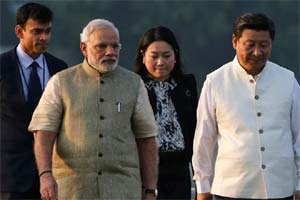New Delhi is likely to soon issue a ‘non-paper’ to Beijing on its burgeoning trade deficit with China, delays in the promised Chinese investments in India, especially in industrial parks, as well as the innumerable barriers faced by Indian companies in getting market access in the giant neighbouring country.
India’s trade deficit with China has ballooned from just $1.1 billion in 2003-04 to a whopping $48 billion in 2014-15, or four times India’s exports to China in the fiscal.
Total FDI flows from China to India during April 2000-February 2015 were just $888 million (or a minuscule 0.36% of the total $246.5 billion worth total FDI inflows into India during the 15-year period), much below potential.
‘Non-paper’ in diplomatic parlance is a document brought out by a ministry/department of the government or embassy but unofficially (without the letterhead, and marked ‘non-paper’ at the top of the document) with an intention to begin a serious discussion on the sensitive issues mentioned in it. The idea is to encourage urgent action by the other country but at the same time prevent diplomatic conflicts.
What has provoked New Delhi is that though China is known to take quick decisions even regarding massive investments in infrastructure within China and across the world, there has been not much movement regarding its promises to invest and develop two mega industrial parks in Gujarat and Maharashtra and other investments in India including in infrastructure. There have been, however, some difficulties in getting the required land for these industrial parks, the sources added.
The idea was to manufacture power equipment, electronic items, industrial machinery, footwear, apparel and active pharmaceutical ingredients as well as value-added items from these parks and export to China and other markets to boost India’s exports and simultaneously bring down the trade deficit with China.
On its part, sources said, the Indian government has made much progress regarding taking a decision to relax visa norms for Chinese nationals and security restrictions on Chinese investment.
Also, though there was agreement at the highest political level regarding removing barriers to enable Indian companies, particularly in the fields that matters most to India (including IT/ITeS, pharmaceuticals, media and entertainment, farm products and auto components), gain greater market access, there was not much response from the ground level authorities in China to remove these obstacles, the sources added.
“We understand that there is a commercial element in these decisions. Investments may take time. But clearly they (Chinese authorities) are not backing their huge promises made at the highest levels with concrete actions on the ground. They have shown that if they want they can take decisions quickly, but there is a delay regarding actions on India’s interests. We are forced to take up the same complaints again and again,” an official said.
Despite expectations of China promising investments to the tune of $100 billion especially in the field of infrastructure in India during the visit of Chinese President Xi Jinping last September, the actual commitments were only for $20 billion over a five-year period. Not much of it has materialised so far, partly also due to the difficulties that the Modi government is facing in getting the Land Acquisition Bill passed by Parliament.
For Updates Check Economy News; follow us on Facebook and Twitter



